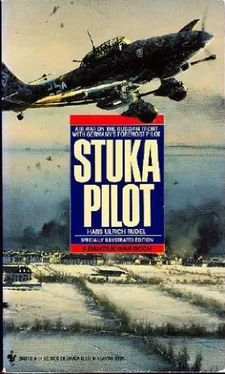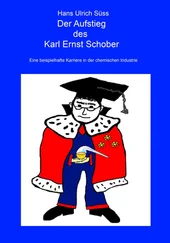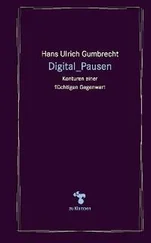After close on two hours we approach the aerodrome, tensely wondering if, even now, the American A.A. guns will open up at us. The large airfield already lies ahead. I instruct my pilots over the R/T that they may only crash-land their aircraft; we do not mean to hand over any serviceable planes. My orders are to unlock the undercarriage and then rip it off in a high speed taxi in. The best way to achieve our object will be to brake violently on one side and to kick the rudderbar on the same side. I can see a crowd of soldiers on the aerodrome; they are paraded—probably a sort of victory roll-call—under the American flag. At first we fly low above the aerodrome in order to make certain that the flak will not attack us as we land. Some of the parade now recognize us and suddenly perceive the German swastika on our wing planes above their heads. Part of the ceremonial muster falls flat. We land as ordered; only one of our aircraft makes a smooth landing and taxis to a stop. A flight sergeant of the 2nd Squadron has a girl on board lying in the tail of his aircraft and is scared that if he makes a so-called bellylanding the damage will extend to his precious feminine stowaway. “Of course” he does not know her; she just happened to be standing so forlornly on the perimeter of the airfield and did not want to be left behind with the Russians. But his colleagues know better.
As the first to come down, I now lie flopped at the end of the runway; already a soldier is standing beside my cockpit pointing a revolver at me. I open the canopy and instantly his hand is outstretched to grab my golden oak-leaves. I shove him back and shut down the hood again. Presumably this first encounter would have ended badly had not a jeep driven up with some officers who dress this fellow down and send him about his business. They come closer and see that I have a blood-drenched bandage: the result of the skirmish above Saaz. They take me first to their dressing station where I am given a fresh bandage. Niermann does not let me out of his sight and follows me like a shadow. Then I am taken to a large partitioned-off room in an upstairs hall which has been fitted out as a kind of officers’ mess.
Here I meet the rest of my colleagues who have been brought straight there: they spring to attention and greet me with the salute prescribed by the Führer. On the far side of the room stands a small group of U.S.A. officers; this spontaneous salute displeases them and they mutter to themselves. They evidently belong to a mixed fighter wing which is stationed here with Thunderbolts and Mustangs. An interpreter comes up to me and asks if I speak English. He tells me that their commanding officer objects, above all things, to this salute.
“Even if I can speak English,” I reply, “we are in Germany here and speak only German. As far as the salute is concerned, we are ordered to salute in this way and being soldiers we carry out our orders. Besides, we do not care whether you object to it or not. Tell your C.O. that we are the ‘Immelmann’ Wing and as the war is now over and no one has defeated us in the air we do not consider ourselves prisoners. The German soldier,” I point out, “has not been beaten on his merits, but has simply been crushed by overwhelming masses of material. We have landed here because we did not wish to stay in the Soviet zone. We should also prefer not to discuss the matter any further, but would like to have a wash and brush up and then have something to eat.”
Some of the officers continue to scowl, but we are able to perform our ablutions in the mess room so copiously that we make something of a puddle. We make ourselves perfectly at home, why shouldn’t we? We are after all in Germany. We converse without embarrassment. Then we eat, and an interpreter comes and asks us in the name of his commanding officer whether we would like to have a talk with him and his officers when we have finished our meal. This invitation interests us as airmen and we oblige, especially as all mention of “the whys and wherefores of the winning and losing of the war” is taboo. From outside comes the noise of shots and rowdiness; the colored soldiers are celebrating victory under the influence of liquor. I should not care to go down into the ground floor hall; jubilation bullets whistle through the air on every side. It is very late before we get to sleep.
Almost everything except what we have on our persons is stolen during the night. The most valuable thing I miss is my flight log-book in which is recorded in detail every operational flight, from the first to the two thousand, five hundred and thirtieth. Also a replica of the “diamonds,” the citation for the diamond pilot medal, the high Hungarian decoration and a lot else are gone, not to mention watches and other things. Even my bespoke peg-leg is discovered by Niermann under some fellow’s bed; presumably he had meant to cut himself a souvenir out of it and sell it later as “a bit of a high-ranking Jerry officer.”
Early in the morning I receive a message that I am to come to the H.Q. of the 9th American Air Army at Erlangen. I refuse until all my pilfered belongings have been returned to me. After much persuasion in which I am told that the matter is very urgent and that I can rely on getting my things back as soon as the thief has been caught, I set off with Niermann. At Air Army H.Q. we are first interrogated by three General Staff officers. They begin by showing us some photographs which they claim to have been taken of atrocities in concentration camps. As we have been fighting for such abominations, they argue, we also share the guilt. They refuse to believe me when I tell them that I have never even seen a concentration camp. I add that if excesses have been committed they are regrettable and reprehensible, and the real culprits should be punished. I point out that such cruelties have been perpetrated not only by our people, but by all peoples in every age. I remind them of the Boer War. Therefore these excesses must be judged by the same criterion. I cannot imagine that the mounds of corpses depicted on the photographs were taken in concentration camps. I tell them that we have seen such sights, not on paper, but in fact, after the air attacks on Dresden and Hamburg and other cities when Allied four-engined bombers deluged them indiscriminately with phosphorus and high explosive bombs and countless women and children were massacred. And I assure these gentlemen that if they are especially interested in atrocities they will find abundant material—and “living” material at that—among their Eastern Allies.
We see no more of these photographs. With a venomous glance at us, the officer making out his report of the interrogation comments when I have had my say: “Typical Nazi officer.” Why one is a typical Nazi officer when one is merely telling the truth is not quite clear to me. Are these gentlemen aware that we have never fought for a political party, but only for Germany? In this belief also millions of our comrades have died. My assertion that they will one day be sorry that in destroying us they have demolished the bastion against Bolshevism they interpret as propaganda and refuse to believe it. They say that with us the wish to divide the allies against each other is father to the thought. Some hours later we are taken to the General commanding this Air Army, Wyland. The general is said to be of German origin, from Bremen. He makes a good impression on me; in the course of our interview I tell him of the theft of the articles already mentioned, so precious to me, at Kit zingen. I ask him if this is usual. He raises Cain, not at my outspokenness, but at this shameful robbery. He orders his adjutant to instruct the C.O. of the unit concerned at Kitzingen to produce my property and threatens a court martial. He begs me to be his guest at Erlangen until everything has been restored to me.
Читать дальше












